AWM41 1040 - [Nurses Narratives] Sister Edith E Simpson
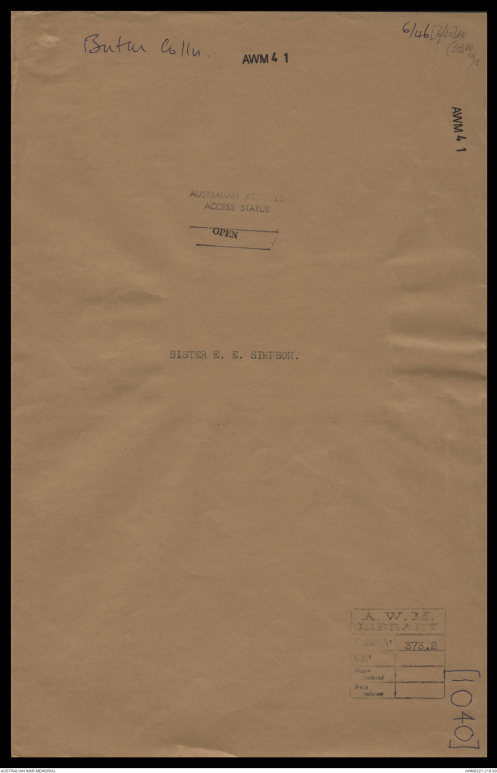
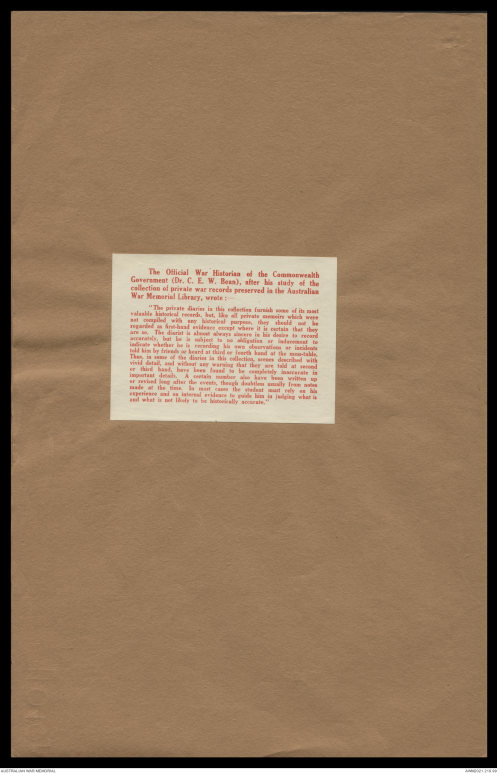
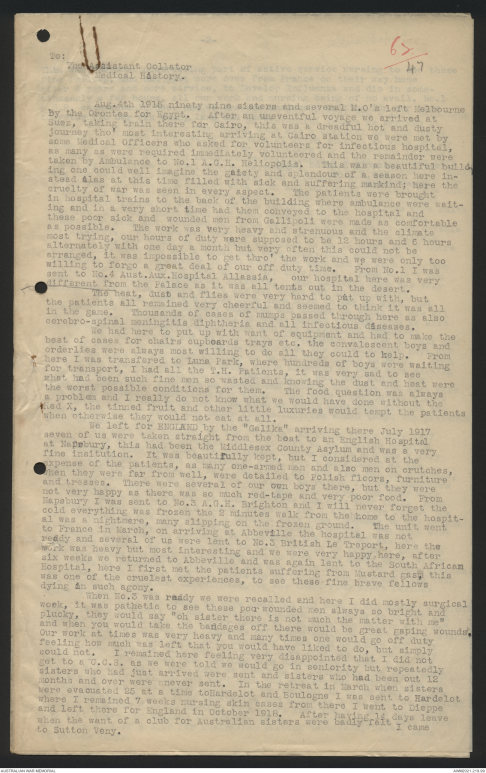
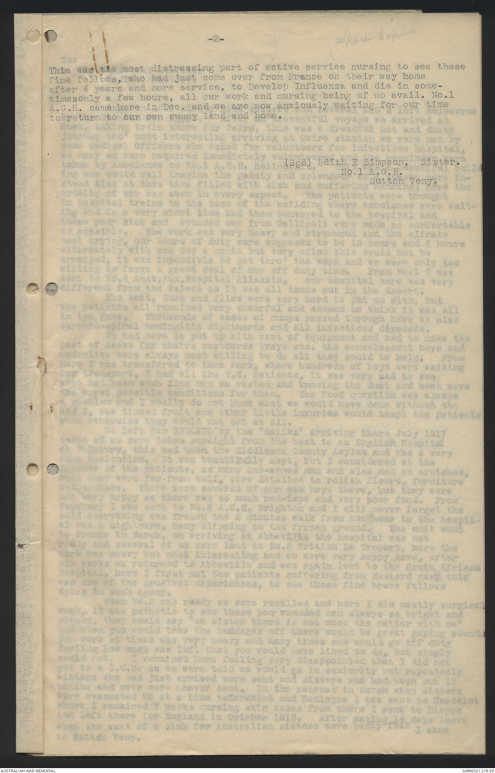
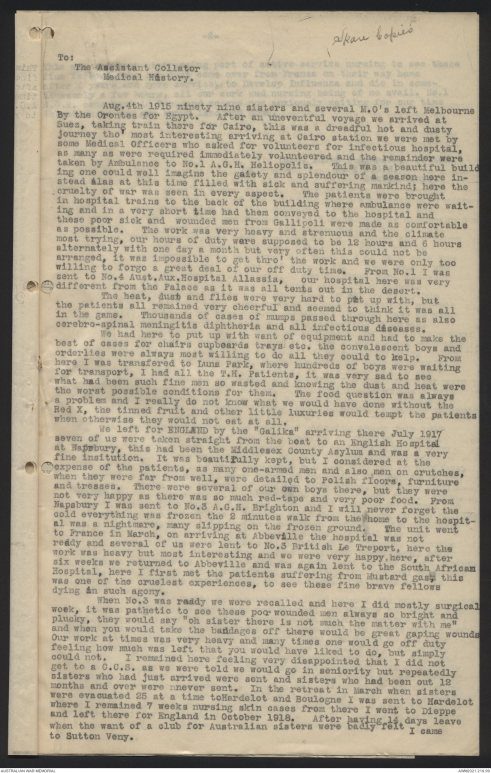
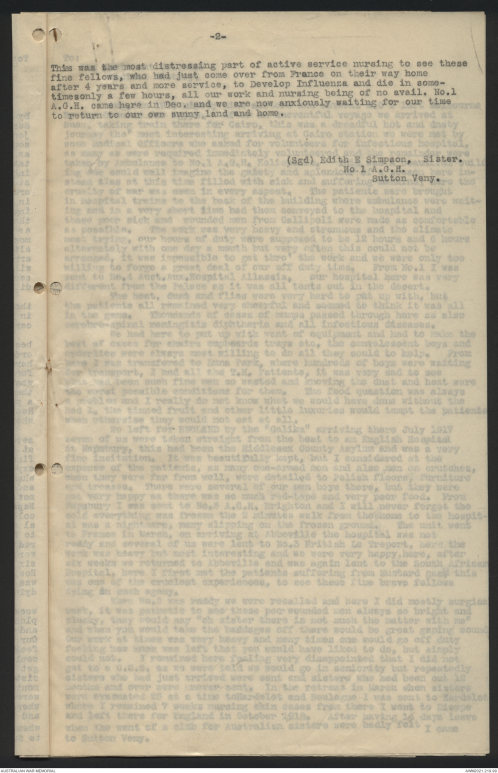
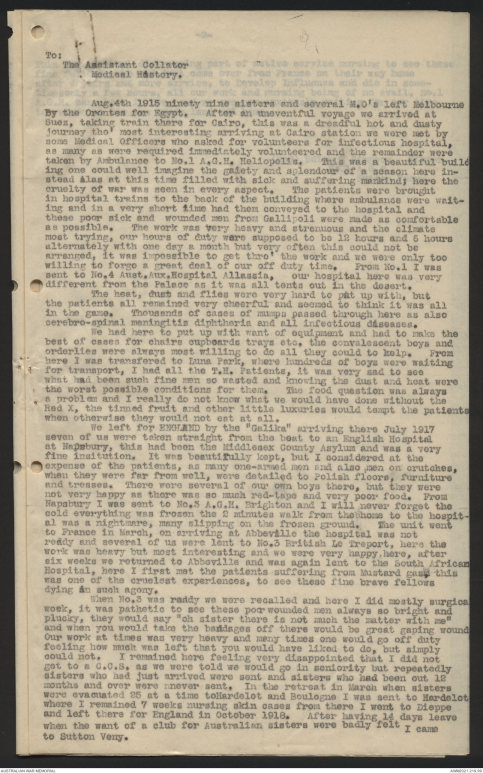
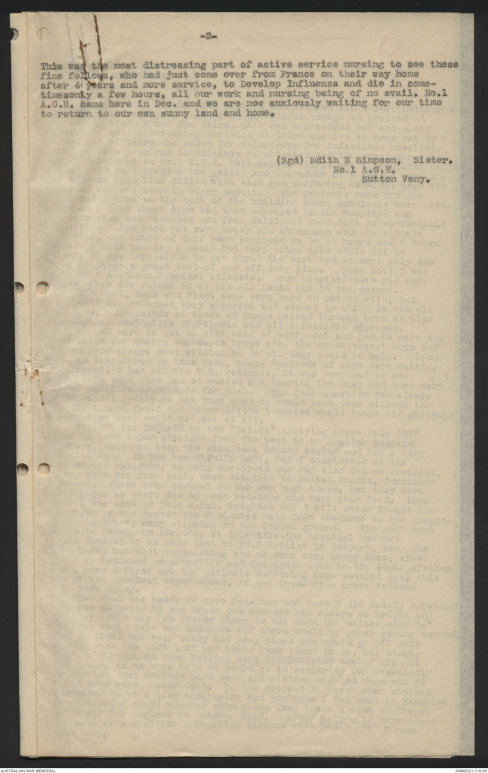
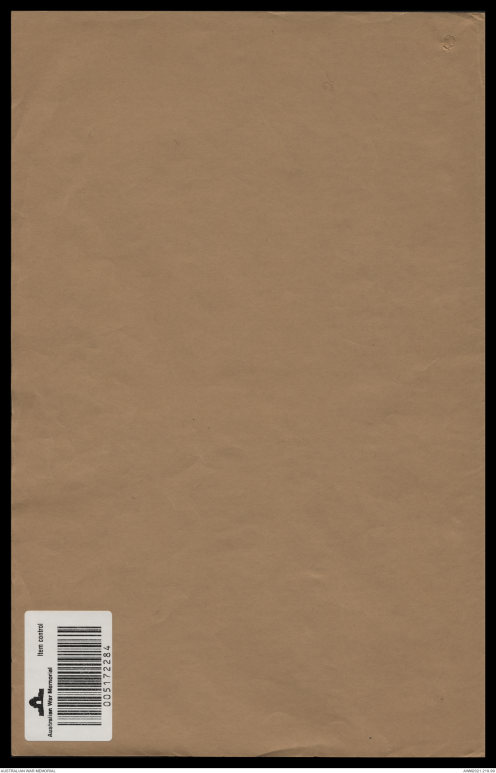
6/46 [[??]]
Butler Colln
AWM41
AUSTRALIAN ARCHIVES
ACCESS STATUS
OPEN ✓
SISTER E. E. SIMPSON.
A.W.M.
LIBRARY
Cha No. 373.2
Cal
[[?]]
[[?]]
[1040]
The Official War Historian of the Commonwealth
Government (Dr. C. E. W. Bean), after his study of the
collection of private war records preserved in the Australian
War Memorial Library, wrote : -
"The private diaries in this collection furnish some of its most
valuable historical records, but like all private memoirs which were
not compiled with any historical purpose, they should not be
regarded as first-hand evidence except where it is certain that they
are so. The diarist is almost always sincere in his desire to record
accurately, but he is subject to no obligation or inducement to
indicate whether he is recording his own observation or incidents
told him by friends or heard at third or fourth hand heard at the mess-table.
Thus, in some of the diaries in this collection, scenes described with
vivid detail, and without any warning that they are told at second
or third hand have been found to be completely inaccurate in
important details. A certain number have been written up
or reviewed long after the events, though doubtless usually from notes
made at the time. In most cases the student must rely on his
experience and on internal evidence to guide him in judging what is
and what is not likely to be historically accurate."
62/47
To:
The Assistant Collator
Medical History
Aug. 4th 1915 ninety nine sisters and several K.O's left Melbourne
By the Orontes for Egypt. After an uneventful voyage we arrived at
Suez, taking train there for Cairo, this was a dreadful hot and dusty
journey tho' most interesting arriving at Cairo station we were met by
as many as were required immediately volunteered and the remainder were
taken by ambulance to No.1 A.G.H. Heliopolis. This was a beautiful build-
ing one could well imagine the gaiety and splendor of a season here in-
stead alas at this time filled with sick and suffering mankind; here the
cruelty of war was seen in every aspect. The patients were brought
in hospital trains to the back of the building where ambulance were wait-
ing and in a very short had them conveyed to the hospital and
these poor sick and wounded men from Gallipoli were made as comfortable
as possible. The work was very heavy and strenuous and the climate
most trying, our hours of duty were supposed to be 12 hours and 6 hours
alternately with one day a month but very often this could not be
arranged, it was impossible to get thro' the work and we were only too
willing to forgo a great deal of our off time. From No.1 I was
sent to No.4 Aust.Aux.Hospital Allassia, our hospital here was very
different from the Palace as it was all tents out in the desert.
The heat, dust and flies were very hard to put up with, but
the patients all remained very cheerful and seemed to think it was all
in the game. Thousands of cases of mumps passed through here as also
cerebro-spinal meningitis diphtheria and all infectious diseases.
We here had to put up with want of equipment and had to make the
best of cases for chairs cupboards trays etc. the convalescent boys and
orderlies were always most willing to do all they could to help. From
here I was transfered to Luna Park, where hundreds of boys were waiting
for transport, I had all the T.H. patients, it was very sad to see
what had been such a fine man so wasted and knowing the dust and heat were
the worst possible condition for them. The food question was always
a problem and I really do not know what we would have done without the
Red X, the tinned fruit and other little luxuries would tempt the patients
when otherwise they would not eat at all.
We left for ENGLAND by the "Galika" arriving there July 1917
seven of us were taken straight from the boat to an English Hospital
at Naprbury, this had been the Middlesex County Asylum and was a very
fine institution. It was beautifully kept, but I considered at the
expense of the patients, as many one-armed men and also men on crutches,
when they were far from well, were detailed to Polish floors, furniture
and tresses. There were several of our own boys there, but they were
not very happy as there was so much red-tape and very poor food. From
Napsbury I was sent to No.3 A.G.H. Brighton and I will never forget the
cold everything was frozen the 2 minutes walk from the home to the hospit-
al was a nightmare, many slipping on the frozen ground. The unit went
to France in March, on arriving at Abbeville the hospital was not
ready and several of us were lent to No.3 British Le Treport, here the
work was heavy but most interesting and we were very happy here, after
six weeks we returned to Abbeville and was again lent to the South African Hospital, here I first met the patients suffering from Mustard gas, this
was one of the cruelest experiences, to see these fine brave fellows
dying in such agony.
When No.3 was ready we were recalled and here I did mostly surgical
work, it was pathetic to see these poor wounded men always so bright and
plucky, they would say "oh sister there is not much the matter with me"
and when you would take the bandages off there would be great gaping wounds. Our work at times was very heavy and many times one would go off duty
feeling how much was left that you would have liked to do, but simply
could not. I remained here feeling very disappointed that I did not
get to a C.C.S as we were told we would go in seniority but repeatedly
sisters who had just arrived were sent and sisters who had been out 12
months and over were never sent. In the retreat in March when sisters
were evacuated 25 at a time toHardelot and Boulogne I was sent to Hardelot
where I remained 7 weeks nursing skin cases from there I went to Dieppe
and left there for England in October 1918. After having 14 days leave
when the want of a club for Australian sisters were badly felt I came
to Sutton Veny.
-2-
This was the most distressing part of active service nursing to see these
fine fellows, who had just come over from France on their way home
after 4 years and more service, to Develop Influenza and die in some-
timesonly a few hours, all our work and nursing being of no avail. No.1
A.G.H. came here in Dec, and we are now anxiously waiting for our time
to return to our own sunny land and home.
(Sgd) Edith H Simpson, Sister.
No.1 A.G.H.
Sutton Veny.
Spare Copies
To:
The Assistant Collator
Medical History.
Aug. 4th 1915 ninety nine sisters and several K.O's left Melbourne
By the Orontes for Egypt. After an uneventful voyage we arrived at
Suez, taking train there for Cairo, this was a dreadful hot and dusty
journey tho' most interesting arriving at Cairo station we were met by
as many as were required immediately volunteered and the remainder were
taken by ambulance to No.1 A.G.H. Heliopolis. This was a beautiful build-
ing one could well imagine the gaiety and splendor of a season here in-
stead alas at this time filled with sick and suffering mankind; here the
cruelty of war was seen in every aspect. The patients were brought
in hospital trains to the back of the building where ambulance were wait-
ing and in a very short had them conveyed to the hospital and
these poor sick and wounded men from Gallipoli were made as comfortable
as possible. The work was very heavy and strenuous and the climate
most trying, our hours of duty were supposed to be 12 hours and 6 hours
alternately with one day a month but very often this could not be
arranged, it was impossible to get thro' the work and we were only too
willing to forgo a great deal of our off time. From No.1 I was
sent to No.4 Aust.Aux.Hospital Allassia, our hospital here was very
different from the Palace as it was all tents out in the desert.
The heat, dust and flies were very hard to put up with, but
the patients all remained very cheerful and seemed to think it was all
in the game. Thousands of cases of mumps passed through here as also
cerebro-spinal meningitis diphtheria and all infectious diseases.
We here had to put up with want of equipment and had to make the
best of cases for chairs cupboards trays etc. the convalescent boys and
orderlies were always most willing to do all they could to help. From
here I was transfered to Luna Park, where hundreds of boys were waiting
for transport, I had all the T.H. patients, it was very sad to see
what had been such a fine man so wasted and knowing the dust and heat were
the worst possible condition for them. The food question was always
a problem and I really do not know what we would have done without the
Red X, the tinned fruit and other little luxuries would tempt the patients
when otherwise they would not eat at all.
We left for ENGLAND by the "Galika" arriving there July 1917
seven of us were taken straight from the boat to an English Hospital
at Naprbury, this had been the Middlesex County Asylum and was a very
fine institution. It was beautifully kept, but I considered at the
expense of the patients, as many one-armed men and also men on crutches,
when they were far from well, were detailed to Polish floors, furniture
and tresses. There were several of our own boys there, but they were
not very happy as there was so much red-tape and very poor food. From
Napsbury I was sent to No.3 A.G.H. Brighton and I will never forget the
cold everything was frozen the 2 minutes walk from the home to the hospit-
al was a nightmare, many slipping on the frozen ground. The unit went
to France in March, on arriving at Abbeville the hospital was not
ready and several of us were lent to No.3 British Le Treport, here the
work was heavy but most interesting and we were very happy here, after
six weeks we returned to Abbeville and was again lent to the South African Hospital, here I first met the patients suffering from Mustard gas, this
was one of the cruelest experiences, to see these fine brave fellows
dying in such agony.
When No.3 was ready we were recalled and here I did mostly surgical
work, it was pathetic to see these poor wounded men always so bright and
plucky, they would say "oh sister there is not much the matter with me"
and when you would take the bandages off there would be great gaping wounds. Our work at times was very heavy and many times one would go off duty
feeling how much was left that you would have liked to do, but simply
could not. I remained here feeling very disappointed that I did not
get to a C.C.S as we were told we would go in seniority but repeatedly
sisters who had just arrived were sent and sisters who had been out 12
months and over were never sent. In the retreat in March when sisters
were evacuated 25 at a time toHardelot and Boulogne I was sent to Hardelot
where I remained 7 weeks nursing skin cases from there I went to Dieppe
and left there for England in October 1918. After having 14 days leave
when the want of a club for Australian sisters were badly felt I came
to Sutton Veny.
-2-
This was the most distressing part of active service nursing to see these
fine fellows, who had just come over from France on their way home
after 4 years and more service, to Develop Influenza and die in some-
timesonly a few hours, all our work and nursing being of no avail. No.1
A.G.H. came here in Dec, and we are now anxiously waiting for our time
to return to our own sunny land and home.
(Sgd) Edith H Simpson, Sister.
No.1 A.G.H.
Sutton Veny.
To:
The Assistant Collator
Medical History.
Aug. 4th 1915 ninety nine sisters and several K.O's left Melbourne
By the Orontes for Egypt. After an uneventful voyage we arrived at
Suez, taking train there for Cairo, this was a dreadful hot and dusty
journey tho' most interesting arriving at Cairo station we were met by
as many as were required immediately volunteered and the remainder were
taken by ambulance to No.1 A.G.H. Heliopolis. This was a beautiful build-
ing one could well imagine the gaiety and splendor of a season here in-
stead alas at this time filled with sick and suffering mankind; here the
cruelty of war was seen in every aspect. The patients were brought
in hospital trains to the back of the building where ambulance were wait-
ing and in a very short had them conveyed to the hospital and
these poor sick and wounded men from Gallipoli were made as comfortable
as possible. The work was very heavy and strenuous and the climate
most trying, our hours of duty were supposed to be 12 hours and 6 hours
alternately with one day a month but very often this could not be
arranged, it was impossible to get thro' the work and we were only too
willing to forgo a great deal of our off time. From No.1 I was
sent to No.4 Aust.Aux.Hospital Allassia, our hospital here was very
different from the Palace as it was all tents out in the desert.
The heat, dust and flies were very hard to put up with, but
the patients all remained very cheerful and seemed to think it was all
in the game. Thousands of cases of mumps passed through here as also
cerebro-spinal meningitis diphtheria and all infectious diseases.
We here had to put up with want of equipment and had to make the
best of cases for chairs cupboards trays etc. the convalescent boys and
orderlies were always most willing to do all they could to help. From
here I was transfered to Luna Park, where hundreds of boys were waiting
for transport, I had all the T.H. patients, it was very sad to see
what had been such a fine man so wasted and knowing the dust and heat were
the worst possible condition for them. The food question was always
a problem and I really do not know what we would have done without the
Red X, the tinned fruit and other little luxuries would tempt the patients
when otherwise they would not eat at all.
We left for ENGLAND by the "Galika" arriving there July 1917
seven of us were taken straight from the boat to an English Hospital
at Naprbury, this had been the Middlesex County Asylum and was a very
fine institution. It was beautifully kept, but I considered at the
expense of the patients, as many one-armed men and also men on crutches,
when they were far from well, were detailed to Polish floors, furniture
and tresses. There were several of our own boys there, but they were
not very happy as there was so much red-tape and very poor food. From
Napsbury I was sent to No.3 A.G.H. Brighton and I will never forget the
cold everything was frozen the 2 minutes walk from the home to the hospit-
al was a nightmare, many slipping on the frozen ground. The unit went
to France in March, on arriving at Abbeville the hospital was not
ready and several of us were lent to No.3 British Le Treport, here the
work was heavy but most interesting and we were very happy here, after
six weeks we returned to Abbeville and was again lent to the South African Hospital, here I first met the patients suffering from Mustard gas, this
was one of the cruelest experiences, to see these fine brave fellows
dying in such agony.
When No.3 was ready we were recalled and here I did mostly surgical
work, it was pathetic to see these poor wounded men always so bright and
plucky, they would say "oh sister there is not much the matter with me"
and when you would take the bandages off there would be great gaping wounds. Our work at times was very heavy and many times one would go off duty
feeling how much was left that you would have liked to do, but simply
could not. I remained here feeling very disappointed that I did not
get to a C.C.S as we were told we would go in seniority but repeatedly
sisters who had just arrived were sent and sisters who had been out 12
months and over were never sent. In the retreat in March when sisters
were evacuated 25 at a time toHardelot and Boulogne I was sent to Hardelot
where I remained 7 weeks nursing skin cases from there I went to Dieppe
and left there for England in October 1918. After having 14 days leave
when the want of a club for Australian sisters were badly felt I came
to Sutton Veny.
-2-
This was the most distressing part of active service nursing to see these
fine fellows, who had just come over from France on their way home
after 4 years and more service, to Develop Influenza and die in some-
timesonly a few hours, all our work and nursing being of no avail. No.1
A.G.H. came here in Dec, and we are now anxiously waiting for our time
to return to our own sunny land and home.
(Sgd) Edith H Simpson, Sister.
No.1 A.G.H.
Sutton Veny.
Item control
Australian War Memorial
005172284
 Sam scott
Sam scottThis transcription item is now locked to you for editing. To release the lock either Save your changes or Cancel.
This lock will be automatically released after 60 minutes of inactivity.